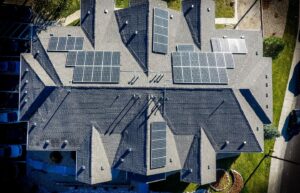Diving into the world of solar energy in Colorado isn’t just about harnessing the sun; it’s about understanding the financial perks that come with it, like solar tax credits. These incentives are crucial for homeowners and businesses looking to make the switch to renewable energy.
In this dynamic landscape, Solar by Peak to Peak emerges as a beacon of reliability and innovation, offering top-tier solar solutions tailored to the unique needs of Colorado residents.
Join us as we delve into the realm of solar tax credits and incentives in Colorado and discover how Solar by Peak to Peak can be your trusted partner on the journey toward energy efficiency and savings.
Solar Tax Credits Overview
Federal Incentives
The federal solar tax credit covers a percentage of the cost of solar panel installation. Homeowners and businesses can claim this until a specified year. After that, it decreases before phasing out completely for residential installations. Commercial projects retain credit beyond the phase-out period.
To be eligible, you must own the solar system outright, it must be located at a residence in the United States, and the system has to be new or being used for the first time. The incentive aims to encourage the adoption of solar energy by making it more affordable.
State Credits
Several states offer additional solar tax credits. These can significantly reduce the upfront costs when combined with federal incentives.
State credits vary widely in terms of eligibility and benefits. Some have caps on the amount that can be claimed, while others are unlimited. For maximum savings, homeowners should research their centennial state’s specific requirements.
Understanding the cash or incentive value offered can greatly impact decision-making regarding home upgrades or investments in renewable energy.
Local Incentives
Local governments also provide extra incentives for solar power adoption. These can include rebates for purchasing solar panels or property tax exemptions for homes with solar systems installed.
The types of local incentives differ greatly. To apply, residents usually need to contact their local government office or visit their website for details. Restrictions often depend on the location of your property within certain municipalities.
Additionally, some incentives may be tailored to encourage investment and development in specific areas, fostering growth and revitalization in the broader community. These incentives might include tax breaks or grants aimed at businesses looking to establish or expand operations within the county.
Furthermore, individuals may find benefits from initiatives that promote the preservation or improvement of personal property, further enhancing the overall well-being of the community.
Understanding Net Metering
Program Benefits
Net metering offers immediate financial benefits to homeowners. They see lower electricity bills from day one. Over time, the savings add up, making solar panels a wise investment.
The environmental impact is significant too. Solar power reduces reliance on fossil fuels. This leads to fewer carbon emissions and a healthier planet. Homeowners contribute to energy independence, reducing the nation’s need for imported energy.
Another benefit is increased home value. Homes with solar installations often sell at a premium. Buyers appreciate the savings on utility bills and the home’s green credentials.
Enrollment Process
To qualify for solar tax credits, homeowners must first install a solar energy system. They should keep all receipts and documentation of the installation.
Deadlines are crucial. The federal solar tax credit has specific cutoff dates each year. Missing these can delay benefits until the next tax season.
Consulting with a tax professional or solar advisor is wise. They can ensure homeowners meet all requirements and maximize their credits. This step makes enrollment smoother and more beneficial.
Solar Panel Costs
Installation Expenses
Solar panel installation involves several costs. These include the price of the panels, inverters, wiring, and labor. Labor costs can vary widely depending on your location and the complexity of your system.
Most expenses are eligible for tax credits, notably the federal solar tax credit, which covers a significant portion of the total cost. However, maintenance or extended warranty costs do not qualify.
Financing options like solar loans, leases, and power purchase agreements (PPAs) help manage upfront costs. Each option has its benefits and drawbacks, impacting eligibility for tax credits. Solar loans allow homeowners to own their systems outright, making them eligible for tax credits.
Leases and PPAs offer no upfront costs but may not qualify for personal tax credits since the system is not homeowner-owned.
Estimated Savings
Homeowners can expect significant savings from solar tax credits. On average, the federal solar tax credit reduces installation costs by 26%. Savings vary based on system size and location due to differences in sunlight exposure and local utility rates.
The long-term savings from reduced utility bills are substantial. With net metering policies in place, homeowners can offset their electricity use with solar energy production, leading to lower monthly bills.
Over time, these savings can fully recoup the initial investment in solar installation, providing a significant boost to homeowners’ finances.
State-Specific Incentives
Colorado Rebates
Colorado offers generous rebates to residents installing solar panels. These rebates can significantly reduce upfront costs. The state’s major utility companies provide these incentives, each with its own set of eligibility requirements.
To qualify, homeowners must usually demonstrate that their solar installations meet specific energy efficiency standards.
Applying for these rebates involves submitting detailed documentation of the solar installation. This includes contracts, proof of residence, and an energy audit report. The difference between state and local rebates lies in their availability and amount. Local rebates often supplement state ones, offering additional savings to residents in certain municipalities.
Energy Loan Programs
Soar installations can be financed through various loan programs. These loans come with different terms and interest rates, depending on the lender. Eligibility often hinges on the applicant’s credit score and the projected efficiency of the solar installation.
Government-backed loans tend to offer more favorable terms, such as lower interest rates and longer repayment periods. Private financing options vary widely but can provide quicker access to funds for those not qualifying for government loans. Comparing these options is crucial for finding the best deal.
Renewable Energy Equipment
Tax Exemption Details
Property and sales tax exemptions significantly lower the cost of solar installations. These exemptions mean you don’t pay extra taxes on the value your solar system adds to your home. They also remove sales tax from the purchase price. This makes renewable energy equipment more affordable.
Several states offer these benefits, making them hotspots for solar investments. For example, New York exempts 100% of the value added by solar panels from property taxes for 15 years. On the sales tax front, New Jersey offers a full exemption, meaning residents don’t pay any state sales tax on solar panel purchases.
Applying for these exemptions is straightforward but varies by state. Generally, you must file specific forms with your local tax authority after installing your residential renewable energy equipment. It’s essential to check your state’s Department of Revenue website or consult with a solar installer who knows the local landscape.
These incentives complement state-specific incentives discussed earlier. Together, they form a robust support system for homeowners looking to transition to clean energy. By reducing upfront costs and offering long-term savings on electricity bills, these exemptions make solar power more accessible and appealing.
Solar Leasing Availability
Leasing Benefits
Leasing solar panels presents several advantages for homeowners. It eliminates the upfront cost of purchasing the system outright. This makes solar energy more accessible to a broader audience. Homeowners can start saving on their energy bills without a significant initial investment.
However, leasing affects eligibility for solar tax credits and incentives. The financial benefits, such as the federal solar tax credit, go to the owner of the solar system—in this case, the leasing company. While this may seem like a drawback, many leasing companies factor these savings into the lease agreements, offering lower monthly payments to homeowners.
In Aurora, CO, typical lease terms range from 10 to 25 years. Homeowners should consider the length of the agreement and any potential early termination fees. They should also think about how long they plan to stay in their current home. These factors are crucial in deciding whether leasing is the right option.
Energy Efficiency Programs
Energy Smart
The Energy Smart program aims to help homeowners and businesses reduce their energy consumption. It focuses on making properties more efficient and promoting renewable energy sources. To participate, individuals must own property within the program’s covered areas.
Benefits include personalized advice on energy saving, access to qualified contractors, and financial assistance for improvements. The program strongly supports solar installations, providing a pathway to harness complete energy from the sun while reducing excess energy use.
Holy Cross Rebates
Holy Cross Energy offers a rebate program specifically for solar panel installations. This initiative is open to both residential and commercial members looking to make their properties more sustainable.
Applicants must follow a straightforward process, starting with an energy assessment of their property. Rebate amounts vary, but they can significantly lower the upfront cost of solar systems. These rebates work alongside state and federal incentives, offering a comprehensive package for those aiming for energy efficiency.
Shine Brighter with Solar by Peak to Peak: Your Premier Choice in Colorado
Commitment to Excellence
At Solar by Peak to Peak, our dedication to high-quality solar solutions is unwavering. We ensure every project meets the highest standards of efficiency and sustainability. Our team works tirelessly, using only top-tier solar panels and equipment. This commitment guarantees long-lasting performance for your home or business.
We understand the importance of transitioning from traditional energy sources discussed in the “Energy Efficiency Programs” section. Thus, we strive to make solar power accessible and affordable for all Coloradans.
Diverse Expertise
Our expertise spans a wide range of solar installations. Whether it’s residential rooftops or large-scale commercial projects, we’ve got you covered. Our skilled technicians tailor each system to meet specific energy needs and preferences.
We pride ourselves on staying updated with the latest technology in solar power. This enables us to offer innovative solutions that maximize energy production and minimize costs.
Navigating Tax Credits
Navigating solar tax credits can be complex. However, our team at Solar by Peak to Peak makes it simple. We will guide you through the process of applying for and maximizing these incentives. Our knowledge of federal and state-level tax credits ensures you get the best financial benefits from your investment in solar energy.
Solar Energy: Your Key to Enhanced Incentives and Sustainable Savings in Aurora
Diving into solar energy unwraps the essentials—from tax credits that sweeten the deal to net metering that maximizes your investment.
You’ve seen how solar panel costs are not just numbers but a gateway to greener living and state-specific incentives that make going solar a no-brainer in many regions. With options like solar leasing and energy efficiency programs, it’s clear: the sun’s bounty is ripe for the taking.Act now. Solar by Peak to Peak stands ready to illuminate your path to sustainable energy, ensuring you reap all the benefits solar power has to offer. Make that switch today. Your move towards renewable energy isn’t just good for your wallet; it’s a giant leap for our planet. Let’s make it happen.




